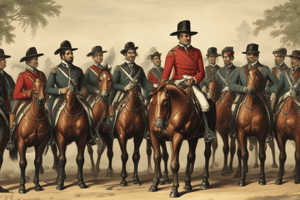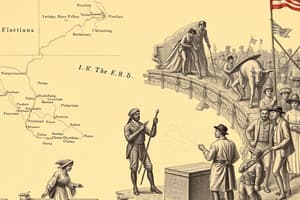Podcast
Questions and Answers
What was the main focus of the Lincoln-Douglas debates?
What was the main focus of the Lincoln-Douglas debates?
- State rights vs. federal authority
- Economic policies of the U.S.
- International relations of the U.S.
- The spread of slavery in the west (correct)
Which political party nominated Abraham Lincoln for the U.S. Senate in 1858?
Which political party nominated Abraham Lincoln for the U.S. Senate in 1858?
- Democratic Party
- Libertarian Party
- Whig Party
- Republican Party (correct)
What doctrine did Stephen Douglas present during the debates?
What doctrine did Stephen Douglas present during the debates?
- Emancipation Proclamation
- Missouri Compromise
- Freeport Doctrine (correct)
- Compromise of 1850
What criticism did Douglas make against Lincoln's views on slavery?
What criticism did Douglas make against Lincoln's views on slavery?
What was a significant outcome for Lincoln despite losing the Senate election?
What was a significant outcome for Lincoln despite losing the Senate election?
What was a significant effect of the Dred Scott decision on the issue of slavery?
What was a significant effect of the Dred Scott decision on the issue of slavery?
Which political party was formed in 1854 in opposition to the expansion of slavery?
Which political party was formed in 1854 in opposition to the expansion of slavery?
Who was the Democratic candidate elected in 1852?
Who was the Democratic candidate elected in 1852?
What was the main focus of the Lincoln-Douglas debates?
What was the main focus of the Lincoln-Douglas debates?
Which event involved the murder of five pro-slavery individuals by abolitionists?
Which event involved the murder of five pro-slavery individuals by abolitionists?
What was the ruling of the Supreme Court in the Dred Scott case?
What was the ruling of the Supreme Court in the Dred Scott case?
Who was the senator that introduced the Kansas-Nebraska Act?
Who was the senator that introduced the Kansas-Nebraska Act?
Which statement about the political landscape during the expansion of slavery is true?
Which statement about the political landscape during the expansion of slavery is true?
Flashcards are hidden until you start studying
Study Notes
Political Changes Due to Slavery Expansion
- Political parties in the U.S. evolved as the movement to expand slavery intensified.
- In 1854, a coalition of Whigs, Democrats, Free-Soilers, and abolitionists formed the Republican Party, uniting against the westward spread of slavery.
- The Republican Party nominated John C. Fremont to oppose the expansion of slavery, which led to difficulties for Democratic candidates who supported the Kansas-Nebraska Act.
- James Buchanan, who had not participated in the Kansas-Nebraska debate, won the presidency by securing votes from 14 of 15 slave states.
- Franklin Pierce was the Democratic candidate who won the presidential election of 1852.
- Stephen Douglas, a key senator, introduced the Kansas-Nebraska Act, which divided the Louisiana Purchase into Kansas and Nebraska territories.
Violent Conflicts
- The Pottawatomie Massacre involved John Brown and abolitionists murdering five pro-slavery individuals at Pottawatomie Creek, escalating tensions.
- Preston Brooks, a South Carolina representative, infamously beat Charles Sumner, a Massachusetts senator criticizing pro-slavery leaders, highlighting the violent divide.
Dred Scott Decision
- Dred Scott was a slave who sued for freedom after his owner took him to a free territory, claiming he became free there.
- The Supreme Court case (Dred Scott v. Sandford) reached a verdict in 1857, ruling that African Americans were not citizens and thus had no right to sue.
- Chief Justice Roger B. Taney declared the Missouri Compromise's restriction on slavery unconstitutional, pleasing most white Southerners while alarming Northerners like Abraham Lincoln, who warned of the decision's implications.
Lincoln-Douglas Debates
- Abraham Lincoln was nominated by Illinois Republicans for the U.S. Senate in 1858, running against incumbent Stephen Douglas.
- The debates became historic, with Lincoln highlighting the dangerous expansion of slavery in the west.
- Douglas responded by criticizing Lincoln's assertion that the nation could not remain "half slave and half free."
- Douglas introduced the Freeport Doctrine, asserting that local populations had the right to determine the presence of slavery, even contradicting the Supreme Court.
- Although Douglas won the debate, Lincoln emerged as a prominent Republican leader and eventually became president.
Studying That Suits You
Use AI to generate personalized quizzes and flashcards to suit your learning preferences.




